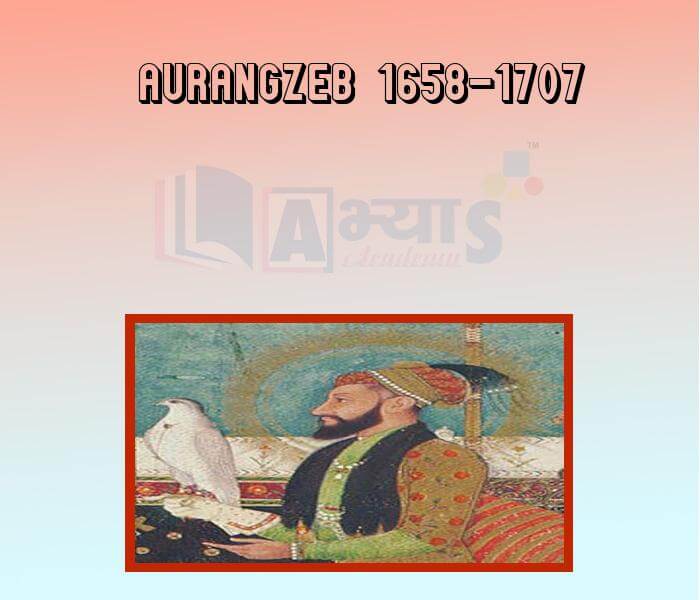Aurangzeb 1658-1707












Aurangzeb 1658-1707
Aurangzeb 1658-1707: Aurangzeb's reign ranges from 1658 to 1707. His campaign against Maratha Chieftains Shivaji was very important.
Aurangzeb’s Empire: Aurangzeb was almost always at war with one ruler or the other. Aurangzeb spent the first half of his 50 year reign(1658-1682CE) in the northern territory and the second half(1682-1707CE) trying to annex the Deccan. Born in 1618 CE Aurangzeb was the third son of shah Jahan and Mumtaz Mahal The empire of Aurangzeb was the biggest anyone had ever IN India. He ruled for (1658-1707CE) almost 50 year.
Religious Policy: Aurangzeb firmly believed that it was his duty to strengthen Islam in the empire. He discontinued the policy of religious tolerance followed by the earlier Mughal rulers. He reimposed the jaziya, the religion tax on non-Muslim that Akbar had abolished.
Rajput Policy: Aurangzeb tried to annex their kingdoms and waged several battles against them. As a result, he lost the loyalty and support of the Rajputs. He also lost money, time and many of his generals.
Deccan Policy: Aurangzeb spent 26 years of his life and religion in the Deccan, which he could neither control nor ignore. This brought him into direct confrontation with the rising power of the Marathas. Aurangzeb won the kingdoms of Bijapur in 1681 CE however; the victories came at a steep cost. Aurangzeb suffered heavy loss of soldiers and money.
Aurangzeb and Sikhs: The execution of the ninth Sikh guru, Guru Teg Bahadur by Aurangazeb made the peace-loving Sikhs take up arms. Under the 10th guru, Guru Gobind Singh, the Sikh fought bitterly against Aurangazeb.
Mughal Tradition of Succession: The Mughals did not believe in the rule of primogeniture where the eldest son inherited his father’s estate. Instead they followed the Mughal and timurid custom of coparcenary inheritance, or a division of the inheritance amongst all the sons.
Students / Parents Reviews [10]
My experience was very good with Abhyas academy. I am studying here from 6th class and I am satisfied by its results in my life. I improved a lot here ahead of school syllabus.

Ayan Ghosh
8thIt was a good experience with Abhyas Academy. I even faced problems in starting but slowly and steadily overcomed. Especially reasoning classes helped me a lot.

Cheshta
10thAbhyas is a complete education Institute. Here extreme care is taken by teacher with the help of regular exam. Extra classes also conducted by the institute, if the student is weak.

Om Umang
10thOne of the best institutes to develope a child interest in studies.Provides SST and English knowledge also unlike other institutes. Teachers are co operative and friendly online tests andPPT develope practical knowledge also.

Aman Kumar Shrivastava
10thA marvelous experience with Abhyas. I am glad to share that my ward has achieved more than enough at the Ambala ABHYAS centre. Years have passed on and more and more he has gained. May the centre flourish and develop day by day by the grace of God.

Archit Segal
7thI have spent a wonderful time in Abhyas academy. It has made my reasoning more apt, English more stronger and Maths an interesting subject for me. It has given me a habbit of self studying

Yatharthi Sharma
10thIt has a great methodology. Students here can get analysis to their test quickly.We can learn easily through PPTs and the testing methods are good. We know that where we have to practice

Barkha Arora
10thMy experience with Abhyas academy is very good. I did not think that my every subject coming here will be so strong. The main thing is that the online tests had made me learn here more things.

Hiya Gupta
8thMy experience with Abhyas is very good. I have learnt many things here like vedic maths and reasoning also. Teachers here first take our doubts and then there are assignments to verify our weak points.

Shivam Rana
7thBeing a parent, I saw my daughter improvement in her studies by seeing a good result in all day to day compititive exam TMO, NSO, IEO etc and as well as studies. I have got a fruitful result from my daughter.
